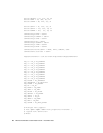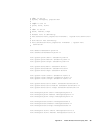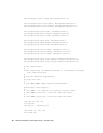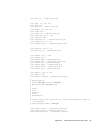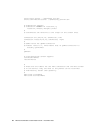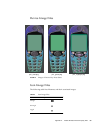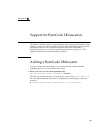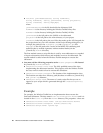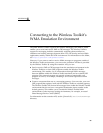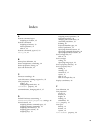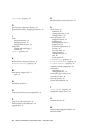
56 Wireless Toolkit Basic Customization Guide • December 2003
■ run(File jarFileObfuscated, String wtkBinDir,
String wtkLibDir, String jarFilename, String projectDir,
String classPath, String emptyApi)
where
jarFileObfuscated is the file that holds the obfuscated JAR
wtkBinDir is the directory holding the Wireless Toolkit binary files
wtkLibDir is the directory holding the Wireless Toolkit JAR files
jarFilename is the full path to the JAR file to be obfuscated
projectDir is the full path to the main directory of your project
classPath is the full path to the set of files that make up the API classpath for
the project based on your API selections in the Project Settings dialog box, for
example, the paths for the cldcapi10.jar and midpapi20.jar files.
emptyApi is the full path to the version of the MIDP API containing stub
methods (that is, method signatures without method bodies) in the
{j2mewtk.dir}\wtklib directory
The first method creates a script file that is used by most obfuscators as a method
of input to determine which classes and methods are not to be obfuscated. The
second method is called when the Wireless Toolkit attempts to execute the
obfuscator.
2. You must add the following properties to the ktools.properties file located
in {j2mewtk.dir}\wtklib\Windows:
■ obfuscator.runner.class.name. The fully qualified name of the class
implementing the obfuscator interface. This property tells the Wireless Toolkit
the class name it needs to load to execute the obfuscator.
■ obfuscator.runner.classpath. The location of the implementation class.
The location can either be a directory path (absolute or relative to {j2mewtk.dir})
or a .jar or .zip filename.
■ obfuscate.script.name. The name of a static script file that you use to
append to your script which is generated through the createScriptFile()
method.
Example
For example, the Wireless Toolkit has an implementation that executes the
ProGuard obfuscator. The class name is com.sun.kvem.ktools.RunPro and it is
located in the ktools.zip file in the wtklib directory. The properties’ values are:
■ obfuscator.runner.class.name: com.sun.kvem.ktools.RunPro
■ obfuscator.runner.classpath: wtklib\\ktools.zip
■ obfuscate.script.name: ignore.rgs



